

Employee Engagement Research (Master List of 29 Studies) Employee engagement is the emotional commitment an employee has to the organization and its goals, resulting in the use of discretionary effort.
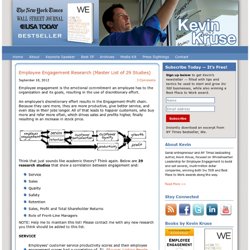
An employee’s discretionary effort results in the Engagement-Profit chain. Because they care more, they are more productive, give better service, and even stay in their jobs longer. All of that leads to happier customers, who buy more and refer more often, which drives sales and profits higher, finally resulting in an increase in stock price. Think that just sounds like academic theory?
Think again. Service Sales Quality Safety Retention Sales, Profit and Total Shareholder Returns Role of Front-Line Managers NOTE: Help me to maintain this list! Employees’ customer service productivity scores and their employee engagement scores had a correlation of .51. ( Source: Linking People Measures to Strategy. Les indicateurs de performance RH, point de départ du BigData.
Limite et puissance du Big Data appliqué aux ressources humaines chez Google. Par Hubert Guillaud le 26/06/13 | 6 commentaires | 4,036 lectures | Impression Les promesses des Big Data appliquées à l’emploi sont à la fois stimulantes et terrifiantes, soulignions-nous il y a peu.
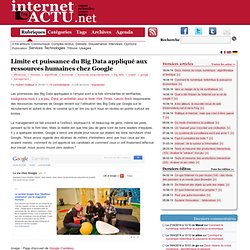
Dans un entretien pour le New York Times, Laszlo Bock responsable des ressources humaines de Google revient sur l’utilisation des Big Data par Google sur le recrutement et autant le dire, le constat qu’il en tire (ou qu’il nous en révèle) en pointe surtout les limites.
Les avantages en temps réel des Big Data pour les RH, c’est maintenant ! « En Pratique. Quand une entreprise recrute, c’est parce qu’elle a besoin immédiatement du bon profil sur une mission qui participe à atteindre ses objectifs stratégiques.
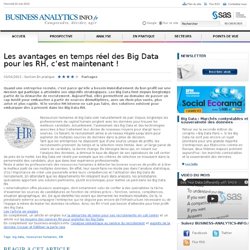
Companies Making HR Big Data Work. Some early adopters have integrated big data into human resources practices with noteworthy results.
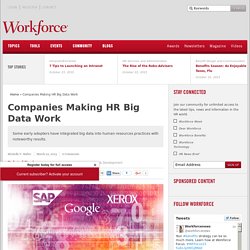
Here are a few examples: It's no surprise the information giant relies on data to run human resources, too. The $50 billion company uses what it calls "people analytics" to make decisions about a variety of HR issues. In the Project Oxygen mission to build better managers, begun in 2009, Google's people analytics team analyzed data on performance reviews, feedback surveys and nominations for manager awards to come up with eight criteria for effective managers that were ranked in importance and then integrated into training, coaching and performance reviews. The changes resulted in a statistically significant improvement in manager quality for 75 percent of its worst-performing bosses, according to a 2011 New York Times report . Big data Analytics in Retail – Big Data News. Guest blog post by Sandeep Raut , director - BI & Analytics, Syntel.
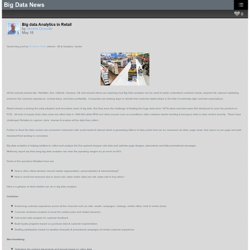
All the industry leaders like Wal-Mart, Axa, Citibank, Humana, GE and several others are exploring how Big Data analytics can be used to better understand customer needs, pinpoint risk, improve marketing, enhance the customer experience, combat fraud, and drive profitability. Companies are seeking ways to rebuild their customer relationships in this time of extremely high customer expectations.
Retail industry is among the early adopters and innovative users of big data. But they have the challenge of tackling the huge data since 1970s when barcodes were first introduced to scan the products at POS. Where to Find More on HR Big Data. If you're educating yourself, staff or C-level management about the human resources "Big Data" push, here are some resources: Big Data, Bigger Deal To read how big data is on HR's radar, please click here.
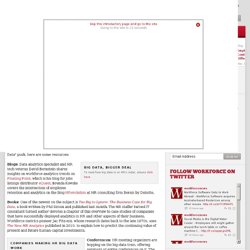
Blogs: Data analytics specialist and HR tech veteran David Bernstein shares insights on workforce analytics trends on Floating Point , which is his blog for jobs listings distributor eQuest . Brenda Kowske covers the intersection of employee retention and analytics on the blog HRevolution at HR consulting firm Bersin by Deloitte. Meet the New Boss: Big Data. HR and Big Data: It’s a Union With Limitless Possibilities.
HR Analytics. Recruitment Intelligence through patterns of historical data performance and future forecasting.
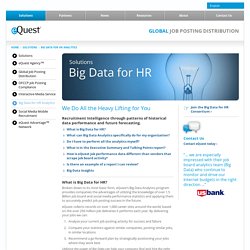
What is Big Data for HR? Broken down to its most basic form, eQuest’s Big Data Analytics program provides companies the advantages of utilizing the knowledge of over 1.5 Billion job board and social media performance statistics and applying them to accurately predict job posting success in the future. eQuest collects records on over 1,000 career sites around the world, based on the over 250 million job deliveries it performs each year. By delivering your jobs we can: Analyze your current job posting activity for success and failureCompare your statistics against similar companies, posting similar jobs, in similar locationsRecommend a go-forward plan by strategically positioning your jobs where they work best Utilizing the power of Big Data can help your company find and hire the right candidate for every position in the organization — faster and more cost effectively.
Chaîne de présentations HRN Europe. Big Data's Human Component - Jim Stikeleather. By Jim Stikeleather | 7:00 AM September 17, 2012 We often forget about the human component in the excitement over data tools.
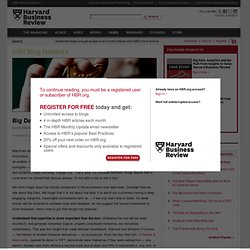
Consider how we talk about Big Data. We forget that it is not about the data; it is about our customers having a deep, engaging, insightful, meaningful conversation with us — if we only learn how to listen. So while money will be invested in software tools and hardware, let me suggest the human investment is more important. Here’s how to put that insight into practice: Understand that expertise is more important than the tool.
Understand how to present information. The point is, we have eons of evolution generating a biological information processing capability that is different and in ways better than that of our digital servants. The Next Big Thing in Big Data: People Analytics. When we use data to uncover the workplace behaviors that make people effective, happy, creative, experts, leaders, followers, early adopters, and so on, we are using “people analytics.”
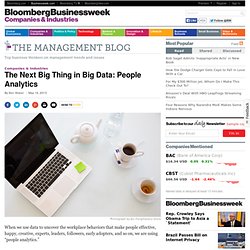
Thousands of years ago, this data came from our observations. By watching others react to changing conditions, people were able to make educated guesses about what makes them effective and happy. Later, we augmented our senses using surveys and interviews, establishing new metrics that were more quantitative, but this did not herald any radical changes in the way people run companies. Can HR Big Data Let Recruiters See into the Future? Leveraging Big Data: HR’s Golden Opportunity to be Strategic Partners. Just as having a saw doesn’t make you an expert carpenter, having Big Data doesn’t make you an expert analyst.
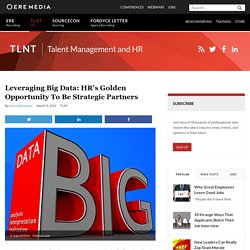
A recent article in the Harvard Business Review, titled Big Data’s Human Component, has reinforced what I’ve been thinking for some time. While the industry is getting excited about Big Data being the “next great tool,” it’s nothing without knowledgeable people making the essential connections. Or as software architect Grady Booch famously stated: “A fool with a tool is still a fool.” Key steps to be able to really use the data OK, “nothing” may be a bit harsh, and so might be Mr. The Challenge of Aligning HR Surveys and Data with Business Value.
Employee surveys can help HR managers identify skills gaps, establish important performance benchmarks and gauge workforce morale. In fact, with data storage costs down, and a wide array of survey software vendors to choose from, never before has it been so easy for companies to riddle their workers with questions. But not everyone is convinced that HR professionals are putting the data they’re collecting from these lengthy questionnaires to good use. To succeed with Big Data in HR – start small! 25/03/2013 at 10:39 Big data is a big thing. It promises to revolutionize the way we do business. It also promises to change the face of HR. Big Data will firmly put HR at the table . Or that is the promise at least. 3 Keys to Successful Big Data Application in HR. Recognize This! – Data is useless unless you know how to analyze your findings, measure the results and report on the ROI of your efforts. I’m a proponent of big data – especially in HR.
You can change a company culture without big data, but you certainly cannot proactively manage it on an ongoing basis. But collecting the data isn’t enough. You have to know what data to collect in the first place, and then what questions to ask about the resulting information as you conduct deep analysis. HR Analytics and Big Data. Linda Merritt, HRO Research Analyst, NelsonHall I recently had the pleasure of moderating a webinar for HR Outsourcing Association ( HROA ) members on HR Analytics and Big Data on behalf of the Publications and Practices Committee. This was a natural hot topic for our group of HR service providers, advisors, analysts, and buyers as you can hardly read your email without finding a new batch of blogs, webinars, articles, and conferences on analytics and big data, including for HR.David Bernstein, the head of eQuest’s Big Data for HR / Predictive Analytics Division, and Yvette Cameron, VP and principal analyst at Constellation Research, Inc. and founder of NextGen Insights, were our guest experts and both have an extensive background and long-term interest in HR measurement and analytics.
The following is a summary from our discussion with Yvette and David. Big Data. There are a few things that most people miss about Big Data in HR. Big Data Last week, I was a guest at the Ultimate Software Users’ Conference. The audience was at least 1,500 strong. The customer loyalty was evident. Big Data was part of the subtext of the meeting. Ron Hanscome, the new analyst at Gartner gave a presentation about Big Data that included the usual admonishments to upskill the HR Team. And, Ultimate is introducing an algorithm that predicts an employee’s retention risk and embeds it directly into their Talent Card, helping leaders more proactively manage their talent. How Big Data Is Transforming the Hunt for Talent. Five Ways to Make Big Data Actionable for HR. Big data offers HR executives the opportunity to contribute more strategically to a business’s operations and decision making. While data related to payroll, performance, compensation, productivity and other aspects of HR is often used to take the pulse of the workforce, when reviewed with the right perspective and integrated properly, it can reveal new insights and empower HR executives to be more strategic contributors to the business.
HR has always used broad metrics, but traditional HR data analysis has focused primarily on looking at a data set from only one perspective. For example, payroll data was reviewed to understand a company’s pay landscape. However, HR data has the potential to be much more predictive, especially given four important evolutions that have driven the rise of big data in HR: • The adoption of unified and integrated global HR systems. . • The demand for self-service. . • The convergence of mobile, social and cloud. . • The application of predictive analytics. Phil Simon: Big Data: A Big Opportunity for HR. Excerpted from Too Big to Ignore: The Business Case for Big Data (John Wiley & Sons) by Phil Simon .
In many organizations, Human Resources (HR) remains the redheaded stepchild. Typically seen as the organization's police department, HR rarely commands the internal respect that most SVPs and Chief People Officers believe it does. I've seen companies place poor performers in HR because they couldn't cut it in other departments. However, I've never seen the reverse occur (e.g., "Steve was horrible in HR, so we put him in Finance. "). For all of their claims about being "strategic partners," many HR departments spend the majority of their time on administrative matters like processing new hire paperwork and open enrollment. Tag Archive for "big data for HR" Recognize This! How can HR use big data to inform people strategy? Jeremy Langley , 09 May 2013 The fact the recent HR Tech Europe Spring conference in London focused not on technology but on data tells you just how important the issue is becoming for organisations.
Why now? Because the volume of data, the velocity (speed at which it is created) and variety (of data points) are growing exponentially and the speed of technology adoption is accelerating significantly. There are 1.8 zettabytes of data being produced a year – that's 1.8 trillion gigabytes – and this is doubling every two years. And we have 30% adoption of mobile in just five years. HR Tech Europe: Big data will enable HR to make better decisions - 4/4/2013. Big Data, Moneyball and Measuring the Right Things in HR. Data In The Workplace. HR as a Data Leader: How It Can Help Solidify Your Strategic Role. Readers of my blogs and articles know that my focus has often been on explaining Big Data. This Big Data phenomenon is quickly spreading throughout the business world. Those that understand it well will be able to garner new insights that will give them a competitive advantage in their business activities.
This is why I’ve focused on demystifying it and talking about how HR can start adopting this new technology to drive business results. For this post, though, I want to change focus a bit. Big Data, Bigger Deal. Black Hills Corp. is taking a new approach to the old problem of finding employees. After a 2008 acquisition, the 130-year-old energy conglomerate doubled its workforce to about 2,000 employees.
With that, the average age of line and operations technicians and other workers at the $1.3 billion public company jumped from approximately 45 to 50. Forecasts showed that, within seven years, close to a quarter of the workforce would be eligible to retire. That kind of turnover could have spelled trouble for utilities that the Rapid City, South Dakota, company runs because it's bound by state regulators to provide gas and electric power with minimal disruptions.
To calculate exactly how many employees would retire a year, the types of workers needed to replace them, where those new hires were most likely to come from and how much training they would need to safely take over for outgoing workers, Black Hills turned to an untried source of help: big data. It's a move more companies are taking. People Analytics at Google: Using Data to Drive HR Strategy and Action. How Big Data Is Playing Recruiter for Specialized Workers. Jim Wilson/The New York Times Jade Dominguez, 26, never went to college, but was hired by Gild, a start-up, after its algorithm put him atop a list of programmers. Jim Wilson/The New York Times “The traditional markers people use for hiring can be wrong, profoundly wrong,” says Vivienne Ming, the chief scientist at Gild since late last year. That someone was Luca Bonmassar . He had discovered Mr. The technology is the product of Gild , the 18-month-old start-up company of which Mr. Optimization of Big Data Helps Predict the Future.
Big data: an opportunity HR professionals cannot afford to ignore, global SHL report warns. Making Sense of BigData in HR (aka Talent Analytics) Investors are more interested in HR data than ever before, says Morgan Stanley executive director.